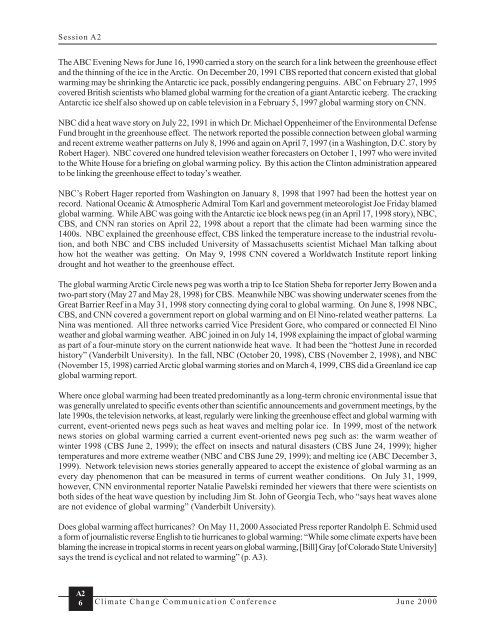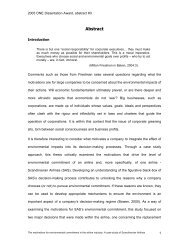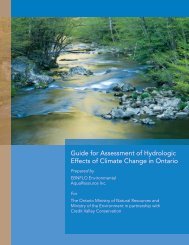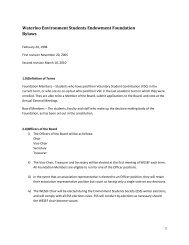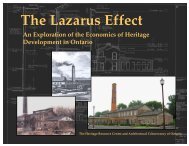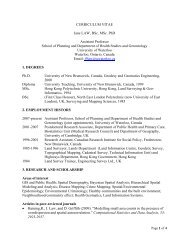Role of the Mass Media in Shaping Perceptions and Awareness of ...
Role of the Mass Media in Shaping Perceptions and Awareness of ...
Role of the Mass Media in Shaping Perceptions and Awareness of ...
Create successful ePaper yourself
Turn your PDF publications into a flip-book with our unique Google optimized e-Paper software.
Session A2The ABC Even<strong>in</strong>g News for June 16, 1990 carried a story on <strong>the</strong> search for a l<strong>in</strong>k between <strong>the</strong> greenhouse effect<strong>and</strong> <strong>the</strong> th<strong>in</strong>n<strong>in</strong>g <strong>of</strong> <strong>the</strong> ice <strong>in</strong> <strong>the</strong> Arctic. On December 20, 1991 CBS reported that concern existed that globalwarm<strong>in</strong>g may be shr<strong>in</strong>k<strong>in</strong>g <strong>the</strong> Antarctic ice pack, possibly endanger<strong>in</strong>g pengu<strong>in</strong>s. ABC on February 27, 1995covered British scientists who blamed global warm<strong>in</strong>g for <strong>the</strong> creation <strong>of</strong> a giant Antarctic iceberg. The crack<strong>in</strong>gAntarctic ice shelf also showed up on cable television <strong>in</strong> a February 5, 1997 global warm<strong>in</strong>g story on CNN.NBC did a heat wave story on July 22, 1991 <strong>in</strong> which Dr. Michael Oppenheimer <strong>of</strong> <strong>the</strong> Environmental DefenseFund brought <strong>in</strong> <strong>the</strong> greenhouse effect. The network reported <strong>the</strong> possible connection between global warm<strong>in</strong>g<strong>and</strong> recent extreme wea<strong>the</strong>r patterns on July 8, 1996 <strong>and</strong> aga<strong>in</strong> on April 7, 1997 (<strong>in</strong> a Wash<strong>in</strong>gton, D.C. story byRobert Hager). NBC covered one hundred television wea<strong>the</strong>r forecasters on October 1, 1997 who were <strong>in</strong>vitedto <strong>the</strong> White House for a brief<strong>in</strong>g on global warm<strong>in</strong>g policy. By this action <strong>the</strong> Cl<strong>in</strong>ton adm<strong>in</strong>istration appearedto be l<strong>in</strong>k<strong>in</strong>g <strong>the</strong> greenhouse effect to today’s wea<strong>the</strong>r.NBC’s Robert Hager reported from Wash<strong>in</strong>gton on January 8, 1998 that 1997 had been <strong>the</strong> hottest year onrecord. National Oceanic & Atmospheric Admiral Tom Karl <strong>and</strong> government meteorologist Joe Friday blamedglobal warm<strong>in</strong>g. While ABC was go<strong>in</strong>g with <strong>the</strong> Antarctic ice block news peg (<strong>in</strong> an April 17, 1998 story), NBC,CBS, <strong>and</strong> CNN ran stories on April 22, 1998 about a report that <strong>the</strong> climate had been warm<strong>in</strong>g s<strong>in</strong>ce <strong>the</strong>1400s. NBC expla<strong>in</strong>ed <strong>the</strong> greenhouse effect, CBS l<strong>in</strong>ked <strong>the</strong> temperature <strong>in</strong>crease to <strong>the</strong> <strong>in</strong>dustrial revolution,<strong>and</strong> both NBC <strong>and</strong> CBS <strong>in</strong>cluded University <strong>of</strong> <strong>Mass</strong>achusetts scientist Michael Man talk<strong>in</strong>g abouthow hot <strong>the</strong> wea<strong>the</strong>r was gett<strong>in</strong>g. On May 9, 1998 CNN covered a Worldwatch Institute report l<strong>in</strong>k<strong>in</strong>gdrought <strong>and</strong> hot wea<strong>the</strong>r to <strong>the</strong> greenhouse effect.The global warm<strong>in</strong>g Arctic Circle news peg was worth a trip to Ice Station Sheba for reporter Jerry Bowen <strong>and</strong> atwo-part story (May 27 <strong>and</strong> May 28, 1998) for CBS. Meanwhile NBC was show<strong>in</strong>g underwater scenes from <strong>the</strong>Great Barrier Reef <strong>in</strong> a May 31, 1998 story connect<strong>in</strong>g dy<strong>in</strong>g coral to global warm<strong>in</strong>g. On June 8, 1998 NBC,CBS, <strong>and</strong> CNN covered a government report on global warm<strong>in</strong>g <strong>and</strong> on El N<strong>in</strong>o-related wea<strong>the</strong>r patterns. LaN<strong>in</strong>a was mentioned. All three networks carried Vice President Gore, who compared or connected El N<strong>in</strong>owea<strong>the</strong>r <strong>and</strong> global warm<strong>in</strong>g wea<strong>the</strong>r. ABC jo<strong>in</strong>ed <strong>in</strong> on July 14, 1998 expla<strong>in</strong><strong>in</strong>g <strong>the</strong> impact <strong>of</strong> global warm<strong>in</strong>gas part <strong>of</strong> a four-m<strong>in</strong>ute story on <strong>the</strong> current nationwide heat wave. It had been <strong>the</strong> “hottest June <strong>in</strong> recordedhistory” (V<strong>and</strong>erbilt University). In <strong>the</strong> fall, NBC (October 20, 1998), CBS (November 2, 1998), <strong>and</strong> NBC(November 15, 1998) carried Arctic global warm<strong>in</strong>g stories <strong>and</strong> on March 4, 1999, CBS did a Greenl<strong>and</strong> ice capglobal warm<strong>in</strong>g report.Where once global warm<strong>in</strong>g had been treated predom<strong>in</strong>antly as a long-term chronic environmental issue thatwas generally unrelated to specific events o<strong>the</strong>r than scientific announcements <strong>and</strong> government meet<strong>in</strong>gs, by <strong>the</strong>late 1990s, <strong>the</strong> television networks, at least, regularly were l<strong>in</strong>k<strong>in</strong>g <strong>the</strong> greenhouse effect <strong>and</strong> global warm<strong>in</strong>g withcurrent, event-oriented news pegs such as heat waves <strong>and</strong> melt<strong>in</strong>g polar ice. In 1999, most <strong>of</strong> <strong>the</strong> networknews stories on global warm<strong>in</strong>g carried a current event-oriented news peg such as: <strong>the</strong> warm wea<strong>the</strong>r <strong>of</strong>w<strong>in</strong>ter 1998 (CBS June 2, 1999); <strong>the</strong> effect on <strong>in</strong>sects <strong>and</strong> natural disasters (CBS June 24, 1999); highertemperatures <strong>and</strong> more extreme wea<strong>the</strong>r (NBC <strong>and</strong> CBS June 29, 1999); <strong>and</strong> melt<strong>in</strong>g ice (ABC December 3,1999). Network television news stories generally appeared to accept <strong>the</strong> existence <strong>of</strong> global warm<strong>in</strong>g as anevery day phenomenon that can be measured <strong>in</strong> terms <strong>of</strong> current wea<strong>the</strong>r conditions. On July 31, 1999,however, CNN environmental reporter Natalie Pawelski rem<strong>in</strong>ded her viewers that <strong>the</strong>re were scientists onboth sides <strong>of</strong> <strong>the</strong> heat wave question by <strong>in</strong>clud<strong>in</strong>g Jim St. John <strong>of</strong> Georgia Tech, who “says heat waves aloneare not evidence <strong>of</strong> global warm<strong>in</strong>g” (V<strong>and</strong>erbilt University).Does global warm<strong>in</strong>g affect hurricanes? On May 11, 2000 Associated Press reporter R<strong>and</strong>olph E. Schmid useda form <strong>of</strong> journalistic reverse English to tie hurricanes to global warm<strong>in</strong>g: “While some climate experts have beenblam<strong>in</strong>g <strong>the</strong> <strong>in</strong>crease <strong>in</strong> tropical storms <strong>in</strong> recent years on global warm<strong>in</strong>g, [Bill] Gray [<strong>of</strong> Colorado State University]says <strong>the</strong> trend is cyclical <strong>and</strong> not related to warm<strong>in</strong>g” (p. A3).A26Climate Change Communication ConferenceJune 2000


